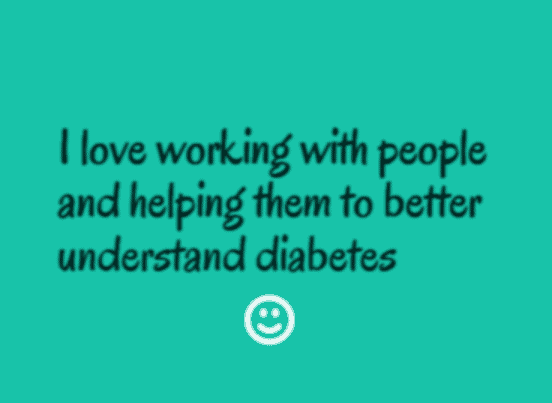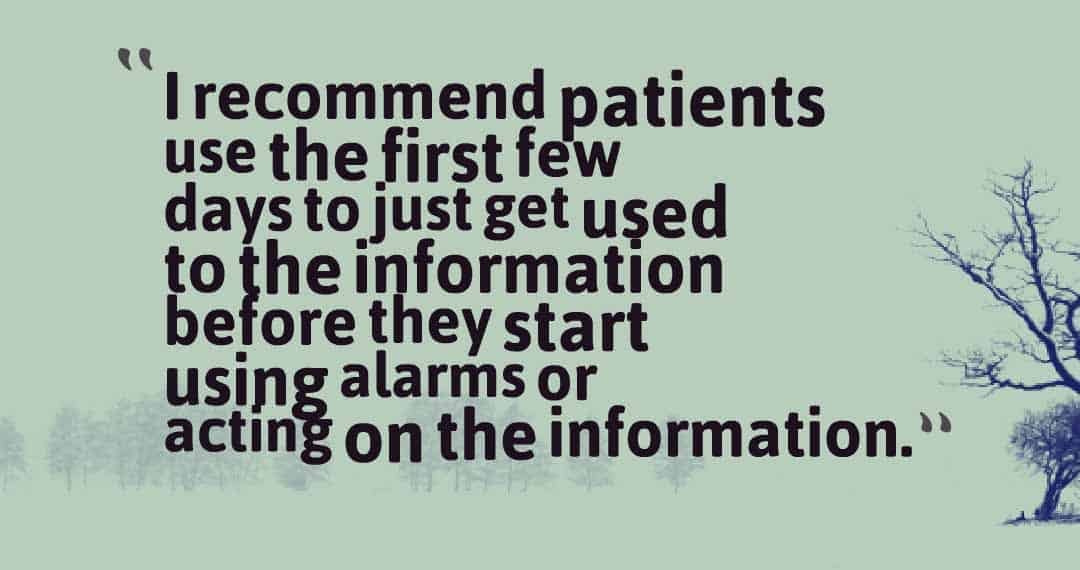I had an opportunity to interview Angela Manderfeld MS, RDN, LD, CDE from Healthy Solutions with Angela.
Let’s start first by telling us more about yourself and your dedication and passion for working with diabetes patients.
I have been a registered dietitian nutritionist for 14 years and a certified diabetes educator for 12 years. My first job was my dream job at an outpatient diabetes and nutrition center. My grandparents have Type 2 diabetes and when I was in college, I would help my grandpa track and graph his blood sugar readings in excel. He loved having a graph to take to his doctor! I love working with people and helping them to better understand diabetes. I love when people get the information they need and it changes their life for the better. I have heard numerous patients say “I think I will be healthier and live a longer life because of my diagnosis because it has forced me to pay attention to my health”. Diabetes can be very scary for a lot of people and I want to help people live high quality, enjoyable lives, despite their diagnosis.
Describe how you evaluate the effectiveness of your teaching methods and the actual learning experience of the client. Do you have quality assurance measures in place for your DSME program?
This is always a work in progress. I love doing the teach back method or providing information and then asking people to tell me what resonated with them. I also make it a point to ask open ended questions often, this keeps me from giving information overload and helps to keep the patient engaged. I watch the person for cues of interest, or boredom, HA! and adjust accordingly. I always find my teaching is more effective if I ask the person first what is important for them to talk about today and what they would like to get out of our visit.
For more diabetes articles I suggest the following:
A patient with new diagnosis of diabetes comes in with an extreme fear of needles, and will not self-inject or check blood sugars. How do you handle this situation? I acknowledge their fear, because no one particularly enjoys getting stuck with needles and fear is a very strong emotion! I remind patients that my job is to provide them information to make educated decisions. So, typically, I will show them what it takes to do a finger stick or a shot. Many times they don’t understand how small the needle is, they are picturing those big immunization needles! I always do one myself so they can see it first, then most of the time they are willing to give it a try as well.
You sense that a patient with newly diagnosed Type 2 diabetes is in denial, and not showing readiness to learn about managing their diabetes. However, they are showing up to class, but keep their arms crossed and appear to be frustrated. Describe your strategy when working with this patient.
I think it’s really important to always acknowledge people’s emotions. Sometimes it’s nice to send an email, make a phone call or pull the patient aside after class and see if they want to talk about anything. Often people experience emotions from anger, guilt, frustration, fear and sadness. Once you can identify what they are feeling, it’s nice to ask questions to gain a better understanding of their concerns. For example, someone may be feeling angry with themselves because they feel that they have brought on their diabetes or frustrated because they have done what the doctor said but their numbers on their meter are still high. Giving the person a chance to voice their feelings and be heard can be helpful in moving past the emotion. Also, once you know what is bothering them, it can help you target the material presented in class so that others may share their similar experiences and help this person feel as though they are not alone. We also always offer attendees the ability to retake the class for free at any time. That way if they are in denial and not all the information is going in, they can try it again when they are ready.
You have a new patient referred with a new kind of insulin pump. Describe your experience with teaching patients to use their insulin pumps, and how you were able to teach them to use their new device.
I have been working with people on insulin pumps for the last 9 years. The training can be super overwhelming so I like to break it down. We will usually meet for a pre pump visit to just talk about what to expect with a pump, how it works and basic things to be aware of. At the pre pump visit it’s also nice to give them a pump and show them the process for hooking it up and let them push buttons a little. Once they have their pump, I like to help them get started right away. As adults, we like instant gratification and we want information as it applies to us only. So, I like to jump right in. A typical pump start begins with programming the settings, practicing how to give a bolus and then we go through the process of hooking up the pump. If someone is not ready on that day and doesn’t feel confident, then I have them go home and play with the pump for a day or two and then come back. The patient always decides when they want to start, I want to make sure they have a good experience. Sometimes we will practice the pump site change 2 or 3 times until they feel very comfortable. At follow up visits and phone calls, we address the advanced pump features based on the patient’s need for them and their lifestyle.
You have a new patient with a CGM. Describe your experience in working with patients with a CGM, and how you were best able to instruct them on the use of the CGM.
CGM is so exciting because now people have more information about their diabetes than ever before! Having all this information can also be overwhelming, so I recommend patients use the first few days to just get used to the information before they start using alarms or acting on the information. People learn best by learning what they want to learn when they want to learn it. So, my approach is to have people tell me what they want to do first. Would you like to put the sensor in first or would you like to talk about the system first? Most of the time people are a little concerned about the sensor and the needle, so many will choose to get that out of the way first so that they can concentrate on the rest of the material without having to worry about what it will be like to put the sensor in.
Your patient comes in and after a full assessment and medication review, you determine that the patient is likely on the wrong medications for their diabetes, and there would be other medications that would provide better control for their diabetes. How do you approach their physician to make the recommendations for this new patient? How do you approach the patient about the possibility of medicine changes in their diabetes regimen?
Well, that is a hard one. Most likely the patient and I would have a discussion about how diabetes is a progressive disease and how medicines that work at one point in time, may not continue to work. I might do a basic review of meds and discuss pros and cons/contraindications, if this interests the patient. I would then encourage the patient to talk to their doctor about some of the medications that sounded like a good fit for them. I would also make a phone call or send a letter to the provider with my concerns and recommendations. I feel it’s important to support other healthcare professionals, while keeping the patients best interest in mind. One thing I’ve learned is that if a patient is on board and helps make decisions regarding their therapy, the therapy is going to work better. When they understand why they do are doing something and how a medication is helping them, they are more likely to want to take it and continue taking it.
If you could say one piece of advice to a newly diagnosed patient or family member what would that be?
You have the ability to control this and lower your risk of complications. Many people will try to give you advice and it can get frustrating. Find some people you trust and can confide in them and let them help you. These people might be friends, family or healthcare professionals, but once you create your own diabetes team, you can’t lose - you don’t have to do this alone!
What is one area of diabetes management you feel is the most challenging?
Hormones. Diabetes would be so easy if it was black and white. Hormones create this “gray area” that can really frustrate people. It’s enough to have to worry about food and how it effects the blood sugar, but hormones can really leave you scratching your head! Just when people feel like they know what’s going on and how their blood sugar responds, they get stressed out or get a steroid shot or have their monthly cycle...
What would you say to someone struggling with coming to an acceptance about having this disease?
Denial is a coping mechanism and just part of life. But letting it go on and on can be damaging to overall health. Accepting that you have diabetes can be very scary because then you have to face the fears and emotions that come along with the disease. I think having a person talk to someone who has diabetes or attending a support group might be a first step. Then they can hear from others who may be feeling the same way they are and then they can also see there are many others living with it and managing it well. Once they are able to express their own emotions about the diagnosis, then it opens the door for them to move on to acceptance and taking action.
Further reading:
What are some challenges you have experienced while working with Diabetes patients?
In one role as a diabetes educator, the majority of people I worked with had Type 2 diabetes for a long duration. The majority had diabetes that was not well controlled. Many of the patients had met with and RD, CDE many times so they felt they had “been there, done that, and didn’t want to do it again”. It got to the point if I had 1 or 2 people who actually wanted to talk to me in a month, I would get really excited and it was enough to keep me going. I just got really frustrated being in a situation where I really wanted to listen to people’s challenges and help them work on a plan, but they had no desire to meet with “the dietitian” because of past experiences or the idea of what they thought I was going to “tell them” to do.
To contact Angela or find more about her visit her website www.healthysolutionswithangela.com
Hopefully this interview proved informative and useful for you.
TheDiabetesCouncil Article | Reviewed by Dr. Sergii Vasyliuk MD on June 02, 2020




